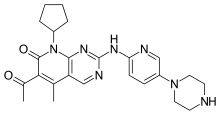Palbociclib
 | |
| Clinical data | |
|---|---|
| Trade names | Ibrance |
| AHFS/Drugs.com | ibrance |
| License data | |
| ATC code | |
| Legal status | |
| Legal status |
|
| Identifiers | |
| |
| Synonyms | PD-0332991 |
| CAS Number | |
| PubChem CID | |
| ChemSpider | |
| KEGG | |
| ChEBI | |
| ChEMBL | |
| PDB ligand | |
| ECHA InfoCard | 100.238.221 |
| Chemical and physical data | |
| Formula | C24H29N7O2 |
| Molar mass | 447.533 g/mol |
| 3D model (JSmol) | |
| |
| |
Palbociclib (codenamed PD-0332991, trade name Ibrance) is a drug for the treatment of ER-positive and HER2-negative breast cancer developed by Pfizer. It is a selective inhibitor of the cyclin-dependent kinases CDK4 and CDK6.[1][2]
Mechanism of action
It is a selective inhibitor of the cyclin-dependent kinases CDK4 and CDK6.[1][2]
Approvals and indications
ER+ breast cancer
The drug was reviewed and approved under the Food and Drug Administration’s (FDA) accelerated Priority Review and Breakthrough Therapy designation programs on February 3, 2015 as a treatment (in combination with letrozole) for patients with estrogen receptor positive advanced breast cancer.[3] This was an accelerated approval.[4]
In March 2017, the FDA granted regular approval to palbociclib for HER2 negative breast cancer, alongsite an aromatase inhibitor. [5]
A phase 3 trial, PALOMA-2, was fully enrolled by February 2015 and reported positive results in April 2016.[6] The results of PALOMA-2 trial (published November 2016) showed significantly longer progression-free survival in patients on palbociclib in combination with letrozole, compared to patients on letrozole and placebo. Progression-free survival was assessed by radiologically confirmed disease progression by RECIST criteria or death during the study. At the time of publication, there was insufficient data on overall survival, and a final analysis is planned after a total of 390 deaths occur per protocol and in agreement with regulatory agencies. Of note, it was noted that the addition of palbociclib caused higher rates of myelotoxic events in the study.[7]
The drug was approved for use in the European Union in November 2016 as a treatment for hormone receptor (HR) positive, human epidermal growth factor receptor 2 (HER2) negative locally advanced or metastatic breast cancer either in combination with an aromatase inhibitor or, for women who have received prior endocrine therapy, in combination with fulvestrant. In pre- or perimenopausal women, a luteinizing hormone releasing hormone agonist should also be given.[8]
Clinical trials
HR+ breast cancer
The PALOMA-3 trial announced in April 2015 that the addition of palbociclib was superior to fulvestrant alone for progression-free survival.[9]
In the phase 2 PALOMA-1 trial reported at the April 2014 annual meeting of the American Association for Cancer Research, the addition of palbociclib to letrozole was shown to significantly slow the progression of advanced cancer (median progression-free survival increased from 10.2 months to 20.2 months), but was not shown to have a statistically significant effect on increasing patients' overall survival times.[10][11][12]
Pricing
Ibrance "can be ordered through select" specialty pharmacies and "sells for $9,850 for 30 days or $118,200 for a year's supply before discounts."[13] According to a statement by the New York–based Pfizer the price "is not the cost that most patients or payors pay" since most prescriptions are dispensed through health plans, which negotiate discounts for medicines or get government-mandated price concessions.[13] In the United States specialty pharmacies fill prescriptions for drugs that are usually high cost.[14][15]
References
- 1 2 Finn, RS; Dering, J; Conklin, D; Kalous, O; Cohen, DJ; Desai, AJ; Ginther, C; Atefi, M; et al. (2009). "PD 0332991, a selective cyclin D kinase 4/6 inhibitor, preferentially inhibits proliferation of luminal estrogen receptor-positive human breast cancer cell lines in vitro". Breast cancer research : BCR. 11 (5): R77. PMC 2790859
 . PMID 19874578. doi:10.1186/bcr2419.
. PMID 19874578. doi:10.1186/bcr2419. - 1 2 Rocca A, Farolfi A, Bravaccini S, Schirone A, Amadori D (2014). "Palbociclib (PD 0332991): targeting the cell cycle machinery in breast cancer". Expert Opin Pharmacother. 15 (3): 407–20. PMID 24369047. doi:10.1517/14656566.2014.870555.
- ↑ "FDA Approves Palbociclib for Metastatic Breast Cancer". OncLive. 3 Feb 2015.
- ↑ "Pfizer Receives U.S. FDA Accelerated Approval of IBRANCE (palbociclib)". Pfizer. 3 Feb 2015.
- ↑ cite web | url=https://www.fda.gov/Drugs/InformationOnDrugs/ApprovedDrugs/ucm549978.htm
- ↑ Late-stage study of expanded use of Pfizer's Ibrance successful; global regulatory applications to follow. April 2016
- ↑ Finn; et al. (November 17, 2016). "Palbociclib and Letrozole in Advanced Breast Cancer". NEJM. pp. 1925–1936. doi:10.1056/NEJMoa1607303.
- ↑ Ibrance (palbociclib) European public assessment report
- ↑ "Pfizer Announces PALOMA-3 Trial For IBRANCE (Palbociclib) Stopped Early Due To Efficacy Seen In Patients With HR+, HER2- Metastatic Breast Cancer Whose Disease Has Progressed Following Endocrine Therapy". April 15, 2015.
- ↑ Breast Cancer Drug Shows ‘Groundbreaking’ Results By ANDREW POLLACK, APRIL 6, 2014
- ↑ Beasley, Deena (6 April 2014). "Pfizer drug doubles time to breast cancer tumor growth in trial". Yahoo! News. Reuters. Retrieved 7 April 2014.
- ↑ Palbociclib Shows Promising Results in Patients With Hormone Receptor-positive Metastatic Breast Cancer, AACR in the News, April 6, 2014
- 1 2 "Pfizer breast cancer drug gets early FDA approval". Daily Mail. London. Associated Press. 3 February 2015. Retrieved 2 November 2015.
- ↑ Herper, Matthew (19 February 2010), "The World's Most Expensive Drugs", Forbes, retrieved 25 June 2015
- ↑ Thomas, Kate; Pollack, Andrew (15 July 2015). "Specialty Pharmacies Proliferate, Along With Questions". Sinking Spring, Pa.: New York Times. Retrieved 5 October 2015.